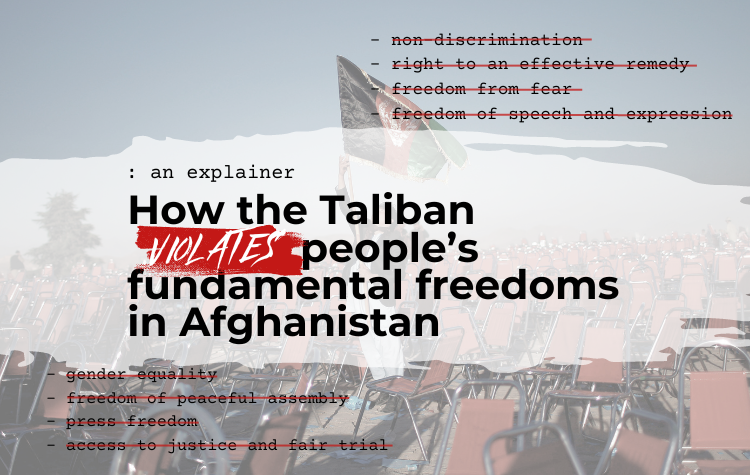Written by: Hafizullah Saeedi, FORUM-ASIA Human Rights Defender Programme
Two years into the Taliban’s takeover, the group has continued to violate human rights, commit crimes under international law, and disempower the people of Afghanistan with impunity.
Since the Taliban’s return to power in August 2021, they have been silencing dissent. In doing so, the Taliban have introduced a range of decrees that violate the fundamental rights and freedoms of the people of Afghanistan, including the right to education, employment, freedom of expression, peaceful assembly, and travel.
Reports of extra judicial killings, forced displacements and disappearances, arrests, abuse, torture, and family intimidation have been on the rise. Within the first six months of Taliban rule, nearly 500 former government soldiers and staff have either been disappeared or killed. According to a United Nations report, “more than two-thirds” of the victims were allegedly killed extrajudicially by the Taliban or its affiliates.
Under the Taliban’s repressive rule, Afghan women are wiped out from public life; ethnic and religious minorities face systematic attacks and exclusion; civil society actors are harshly silenced; and former government employees and security forces are living in constant fear of persecution.
Allegations of war crimes and risks of genocide against Hazaras as well as the collective punishment of non-Pashtun ethnic groups–such as Tajiks, Uzbeks and Turkmen–are concerning.
The Taliban has also been interfering in the delivery of humanitarian aid despite its pledge not to.
The Taliban’s call for amnesty for former government security forces, respect for women’s rights, and counterterrorism efforts turned out to be untrue and deceptive. They broke their promises of ceasefire, dialogue, and negotiation under the 2020 Doha Peace Agreement. In addition, their continued relationship with terrorist groups–such as Al-Qaida–violates the US-Taliban peace agreement.
The Taliban administration is non-representative. Its so-called cabinet is dominated by Sunni Pashtun hardliners. It excludes women and minority religious groups, but includes Taliban figures included in terrorism watchlists.
Without any commitment to Afghanistan’s national and international obligations, the Taliban have abolished all mechanisms and institutions responsible for upholding human rights and the rule of law.
The Taliban replaced Afghanistan’s constitution to an extreme Sharia law, in an effort to justify their barbaric rule and punishments–such as public executions, cutting off hands, and flogging–in the name of Sharia. The Taliban also dissolved the country’s Independent Human Right Commission, Ministry of Women Affairs, and the Independent Bar Association. Without such institutions, Afghans cannot access justice and fair trial.
Human rights defenders—including journalists, academics, lawyers, activists, and artists—have either been silenced, persecuted, or killed. Without press freedom, the people of Afghanistan have been restricted from sharing their truth to the world as well as accessing life-saving information.
What are fundamental freedoms?
All human beings–regardless of sex, sexual orientation, gender identity, race, ethnicity, age, religion, or any other status–have the right to life, freedom, education, employment, security, respect, dignity, and non-discrimination.
Everyone has the right to an effective remedy through competent legal mechanisms. And no one should be subjected to any form of torture, cruelty, abuse, inhumane treatment, and degrading punishment.
Fundamental freedoms also include one’s freedom from fear; freedom of speech and expression; freedom of thought, conscience, belief, and practice; freedom of association and movement; freedom to vote and choose; among other rights that allow a person to act, think, and speak on their own terms and accord without hindrance, discrimination, or intervention.
The Universal Declaration of Human Rights obliges all nations and States to recognize, promote, and respect the fundamental freedoms and human rights of all. No country or entity is exempt from this.
Actions that deprive or restrict a person from practicing and enjoying their fundamental freedoms and human rights could be considered as human rights violations.
What can be done now
The international community’s response to the Taliban–particularly from the UN–has been unsatisfactory.
At present, no significant steps have been taken to formally investigate, document, and address the Taliban’s crimes. Furthermore, the UN’s accountability mechanisms for Afghanistan’s human rights situation have not been supported by UN member states.
Providing unconditional assets release, free engagement, and humanitarian aid flow to the Taliban without seriously holding them to account has given them more leverage.
FORUM-ASIA condemns the human rights violations committed by the Taliban. In solidarity with the people of Afghanistan, we call on the UN, international community, and other stakeholders to:
- Ensure that all sanctions on Afghan women and girls are dissolved immediately, and that their right to education, employment, freedom of expression, and freedom of peaceful assembly and association are respected.
- Ensure that all journalists, activists, human rights defenders, and all those who were unlawfully detained by the Taliban are released immediately.
- Guarantee that revenge killings, summary executions, and forced disappearances of civilians and former government employees are put to an end.
- Protect marginalized ethnic and religious groups’ rights and freedoms and ensure their access to humanitarian aid.
- Protect all Afghan human rights defenders and assist their safe resettlement processes–including visa and travel support–outside Afghanistan.
- Hold the Taliban accountable for violating the fundamental freedoms of millions of Afghans.
- Impose stricter restrictions–such as the UN Security Council and EU sanctions –on Taliban leaders.
Lastly, each of us has the power to combat disinformation by staying informed of the human rights situation in Afghanistan through credible and knowledgeable sources. FORUM-ASIA strives to provide its readers and supporters with facts, evidence-based think pieces, and insightful analyses.



